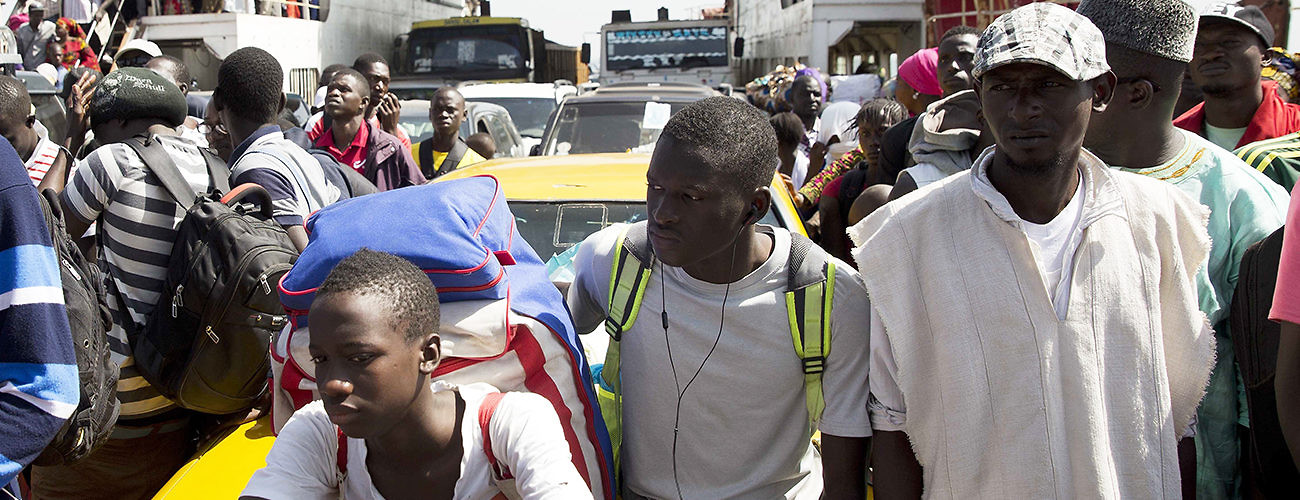A ferry brings people who fled The Gambia back to the country, following the announced departure of former leader Yahya Jammeh. Banjul, The Gambia, January 21, 2017. (Jerome Delay/Associated Press)
The departure of The Gambia’s former President Yahya Jammeh from Banjul on January 21 brings to an end a remarkable confrontation between the autocrat and other leaders of West Africa, the African Union, and the United Nations. The immediate result is a victory for the people of The Gambia, the forces of democracy, and Adama Barrow, who defeated Jammeh in a December 1 national election. It also offers important lessons for those seeking to advance the cause of democracy and the rule of law on the continent more generally.
Jammeh’s peaceful departure came after 7,000 troops from Senegal, Ghana, Nigeria, and other states, under the banner of the Economic Community of West African Nations (ECOWAS), had massed on the border over the weekend. ECOWAS leaders had already decided to arrest Jammeh, who had been in power since 1994, and force his departure if he did not voluntarily step down. The outcome is a case study of how African national, regional, and continental leaders, with UN backing, can come together—if they choose to do so—to enforce a legitimate electoral decision. It required in this instance the credible threat of military intervention by ECOWAS troops, in a move endorsed by regional security institutions and tacitly approved by the UN. The leaders of Nigeria, Liberia, and Ghana had previously met with Jammeh to convince him to step down.
The Gambian crisis was short-lived but tense. Jammeh had initially accepted his defeat to Barrow, a businessman and real estate developer who is largely unknown outside the country. Then, following the more typical pattern of numerous other African dictators, he reversed his decision, declared a 90-day state of emergency, closed the border, ejected foreign journalists, called for a new vote, and appeared ready to use force to stay in power. According to the UN High Commissioner for Refugees, 45,000 people fled to neighboring Senegal, no doubt fearing the worst. With the support of much of his army, it looked for a while like Jammeh might prevail and remain in power.
Then, last weekend, after the last-minute negotiations, the resignation of key members of his cabinet, and faced with a vastly superior force on his doorstep, Jammeh unexpectedly backed down. A strong position by ECOWAS in support of Barrow’s electoral victory and the readiness of troops to directly intervene, as well as the unified political will of the international community, appear to have been decisive. Incredibly, not a single shot was fired.
As Richard Gowan of the Center for International Cooperation noted on Monday, this has been “a heartening display of international support for free and fair elections,” and contrasts with the response to polls in Burundi and South Sudan in which “African powers have failed to back military efforts to uphold democracy and save lives.” In the case of Burundi, Gowan is referencing the abortive AU peacekeeping mission that was told to stand down from a planned stabilization mission following President Pierre Nkurunziza’s disputed re-election in 2015.
In terms of precedent, it needs to be noted that The Gambia is a very small country of under 2 million people, with much less political and economic significance than either Burundi or South Sudan, in which the AU and the UN have been heavily invested with little positive result. Burundi, in particular, holds influence within the AU and is well-regarded by certain East African countries, as well as being a stalwart peacekeeping contributor.
The type of operation witnessed in The Gambia is rare and also controversial. Only on a select few occasions has a multinational force deployed with the express purpose of supporting or restoring a democratically elected government and with UN Security Council support. This happened during the 2010 political crisis in Côte d’Ivoire, in which presidential opposition candidate Laurent Gbagbo declared himself the victor despite losing in the polls. The events culminated in a military intervention, this time by UN peacekeepers and French forces, to restore rightful ruler Alassane Outtara to power.
A similar operation also occurred when ECOWAS intervened in Sierra Leone in 1998 in a bid to return Ahmad Tejan Kabbah to power, which was a decision approved by the Security Council ex post facto. Outside the continent, the Council also authorized “all necessary means” to return Jean-Bertrand Aristide to power in Haiti following a 1991 coup. These and the Gambian case show that enforcement of democratic norms and practices is possible with support from international and regional bodies. Assuming the right conditions, it could become increasingly commonplace.
Barrow’s victory now adds him to the list of freely elected rulers in West Africa, alongside President Johnson Sirleaf of Liberia, President Akufo-Addo of Ghana, and President Sall of Senegal. The sub-region is increasingly casting off its authoritarian roots. A united ECOWAS could help to shape an expectation that essential democratic principles will continue to be upheld. As one headline stated, The Gambia presents “a lesson” for African dictators who cling to power for too long.
Jammeh’s departure is significant for other reasons. During his 22-year rule, he committed numerous human rights violations; many of his opponents were either killed or languished in prison, while he and his family enriched themselves. It remains to be seen whether ECOWAS or President Barrow will seek to put him on trial, seek the return of financial or other resources stolen from the nation, or ultimately live up to democratic ideals. Jammeh himself will have to decide whether to seek asylum in Guinea (home, incidentally, to several former deposed Sierra Leonean leaders) or go elsewhere. The Gambian drama is far from over.





